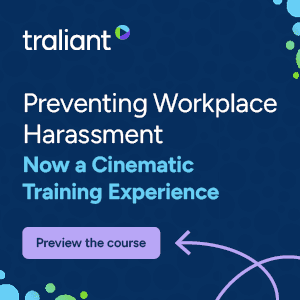With National Disability Employment Awareness Month having just concluded, many companies may use this as a time to take stock of their policies around accommodations for workers with disabilities. Rachel Sweeney, a senior adviser at Paychex, digs into the issues employers need to know heading into 2024.
It’s hard to ignore the changes the world of work has undergone since the Americans with Disabilities Act’s (ADA) initial implementation in 1990. When the first iteration was drafted, the internet was in its infancy and the idea of the modern, remote workforce was nearly unthinkable.
Recent global events and social justice movements have also played a role in shaping the new labor landscape. The Covid-19 pandemic introduced a new awareness around not only chronic illness but the importance of accommodations for personal protection practices. Meanwhile, the conversation around intersectionality in designing DEI practices and a growing understanding of the importance of mental well-being have fundamentally changed the way Americans view their professional lives.
The ADA has gone through as many changes over the years as have the workplaces and public spaces it governs. Through all these changes, though, the basics have remained consistent: The ADA makes it illegal to discriminate against individuals with disabilities by covered employers, public entities and places of public accommodation.
It further requires businesses to make reasonable efforts to accommodate the needs of qualified employees or customers with disabilities by changing policies, procedures and physical environments to make daily tasks, goods and services accessible to everyone.
Ensuring compliance with the ADA remains a critical component of the HR function but can often be a confusing one. As we enter the ADA’s 34th year, it may be time to review some details of the law, the ways it has helped American workers living with chronic conditions and best practices for implementing its provisions in work’s new era.
The ADA in practice
If you often find yourself asking if you’re doing enough to support your disabled employees, you’re not alone. Even though the ADA has been the law of the land for over three decades, we consistently find that leaders are seeking assistance on compliance.
Though the purpose of the ADA is clear, adhering to this guidance can be difficult for employers, particularly because many of the provisions within it feel more subjective than prescriptive. Tweaks and court decisions over the years have worked to clarify the meaning of terms like “reasonable accommodation,” “qualified individual” and “substantially limits,” but qualifiers like these can be difficult to interpret. Each entity has a different threshold for what constitutes “undue hardship” on their business, and that can make compliance tricky.
Can an Employee Be Fired for Sharing a Questionable Social Media Post?
Can an employee get fired for what they post on social media? It depends. While employers have broad leeway to terminate their employees, certain forms of speech – including speech posted on social media – are protected.
Read moreDetailsEmployers looking to firm up their ADA accommodations process and ensure equity in the modern work landscape should keep in mind a few key points that can help them help their people:
There’s value in talking it out
The best way to ensure that your accommodations are up to par is to ask — and the ADA requires leaders to do so through an interactive process, which can take place remotely or through written correspondence. Whatever the venue, employers should make conversations about employees’ needs a priority. Talking with the employee allows the employer and individual to have an open discussion regarding the employee’s functional limitations, the employee’s essential job duties and what each party sees as being reasonable accommodations to support that work.
Every situation is different — and may change over time
The reason the collaborative process described above is so important is that no two situations are the same. Two employees with the same ADA-covered condition may need vastly different accommodations to perform their duties. In fact, it’s more likely than not that adjustments will need to be tailored for each individual staff member.
To ensure ongoing compliance, leaders should take a proactive approach to employee accommodation assessments, keeping in mind that it’s rarely a “one-and-done” affair. Not only do managers need to develop accommodations to suit the individual needs of each employee, but they should also complete regular check-ins about the efficacy of granted accommodations as part of their policies to ensure that accommodations evolve alongside changes in the employee’s status.
There are disabilities you cannot see
An estimated 10% of Americans — and 96% of the total disabled population — live with “invisible disabilities,” things like severe allergies, mental health diagnoses and chronic illnesses that impact mobility or energy levels. The prevalence of these conditions has become a focus for many in the past few years, fueled in part by the emergence of Long Covid, which may become a common example of what employers will need to contend with in the coming years.
It’s important that employers remember that mental health issues, neurological conditions and other invisible diagnoses are just as valid and can be as disruptive to daily activities as more “visible” disabilities. Employers should take care to connect with employees facing these challenges and make appropriate accommodations.
Modern offices demand modern solutions
Though the rise of remote work that came with the pandemic seems to have made it easier for disabled employees to participate in the workforce — participation among disabled Americans has increased significantly over the past few years, according to federal data) — that doesn’t mean the work is done.
In 2022, the DOJ issued guidance on web accessibility to satisfy the ADA. Another proposal from last year sought to extend ADA provisions further into the digital sphere, arguing that ADA rules that govern publicly owned websites should be extended to privately owned pages, which may extend to internal ecosystems for employers.
Neither of these rules has been finalized, but the discussion is a good indication that change is on the horizon. Leaders should consider putting in the work now to develop adequate support for workers.
Where you are might change your requirements
The ADA generally applies to employers with 15 or more employees, but the specifics can vary depending upon state and local laws. While the coverage requirements of the ADA do not change, employers in certain states may be responsible for complying with more or different provisions under state law. As such, it’s important to keep up with local regulations in addition to federal guidance when developing policies and procedures. But even if an employer is not covered by the ADA or similar state/local law, it’s important to make good faith attempts to accommodate affected individuals. Failing to do so could impact morale, productivity and reputation.
Transparency is key
Openness and transparency sit at the heart of effective teams and organizations, and that should extend to ADA processes. Though each situation is different and needs will change, every company’s employee handbook should have a section outlining their ADA policies, the interactive process, reasonable accommodation request procedures, disability leave policies and any other relevant resources.
Disclosing a disability to an employer can be scary for employees that may already be dealing with significant stressors related to their diagnosis or functional abilities. Having clear policies and procedures written down can ease the way and comfort those who may be worried their jobs are at risk. It also sends the message that the business is committed to supporting staff, working with employees to develop solutions and promoting equity within the workplace.
Ensuring equitable employment today and tomorrow
As the world of work and our understanding of various medical conditions continue to change, so too will the practical applications of the ADA. The best practices outlined above can help employers maintain compliance no matter what regulatory changes may happen in the coming years. To keep up with the specifics, leaders can visit the EEOC’s Employer website. For free guidance related to workplace accommodations, the Job Accommodation Network may be helpful.
It is worth remembering that the primary goal of the ADA is to promote equity in opportunities and encourage workforce participation among people from all walks of life. Though the ADA can feel subjective and complex, the spirit of the legislation is simple. Employers who are committed to helping their staff succeed and engage in an open, thoughtful process with their employees, are on the right path.




 Rachel Sweeney is HR services senior adviser at Paychex based in St. Louis. She is an experienced professional, working in HR for over 15 years. She holds a B.S. in management with an emphasis in HR from Missouri State University and is PHR and SHRM-CP certified.
Rachel Sweeney is HR services senior adviser at Paychex based in St. Louis. She is an experienced professional, working in HR for over 15 years. She holds a B.S. in management with an emphasis in HR from Missouri State University and is PHR and SHRM-CP certified. 







